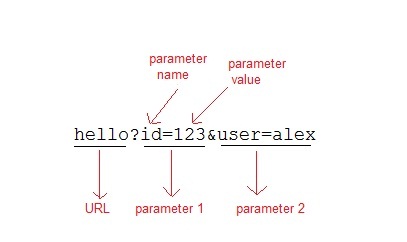Using URL Rewriting for Session Management
If the client has disabled cookies in the browser then session management using cookie wont work. In that case URL Rewriting can be used as a backup. URL rewriting will always work.
In URL rewriting, a token(parameter) is added at the end of the URL. The token consist of name/value pair seperated by an
equal(=) sign.
For Example:
When the User clicks on the URL having parameters, the request goes to the Web Container with extra bit of information at the end of URL. The Web Container will fetch the extra part of the requested URL and use it for session management.
The
getParameter() method is used to get the parameter value at the server side.Example demonstrating usage of URL rewriting
Below mentioned files are required for the example:
index.html
<form method="post" action="validate"> Name:<input type="text" name="user" /><br/> Password:<input type="text" name="pass" ><br/> <input type="submit" value="submit"> </form>
web.xml
<web-app...>
<servlet>
<servlet-name>validate</servlet-name>
<servlet-class>MyServlet</servlet-class>
</servlet>
<servlet-mapping>
<servlet-name>validate</servlet-name>
<url-pattern>/validate</url-pattern>
</servlet-mapping>
<servlet>
<servlet-name>First</servlet-name>
<servlet-class>First</servlet-class>
</servlet>
<servlet-mapping>
<servlet-name>First</servlet-name>
<url-pattern>/First</url-pattern>
</servlet-mapping>
<welcome-file-list>
<welcome-file>index.html</welcome-file>
</welcome-file-list>
</web-app>
MyServlet.java
import java.io.*;
import javax.servlet.*;
import javax.servlet.http.*;
public class MyServlet extends HttpServlet {
protected void doPost(HttpServletRequest request, HttpServletResponse response)
throws ServletException, IOException {
response.setContentType("text/html;charset=UTF-8");
String name = request.getParameter("user");
String pass = request.getParameter("pass");
if(pass.equals("1234"))
{
response.sendRedirect("First?user_name="+name+"");
}
}
}
First.java
import java.io.*;
import javax.servlet.*;
import javax.servlet.http.*;
public class First extends HttpServlet {
protected void doGet(HttpServletRequest request, HttpServletResponse response)
throws ServletException, IOException {
response.setContentType("text/html;charset=UTF-8");
PrintWriter out = response.getWriter();
String user = request.getParameter("user_name");
out.println("Welcome "+user);
}
}


No comments:
Post a Comment